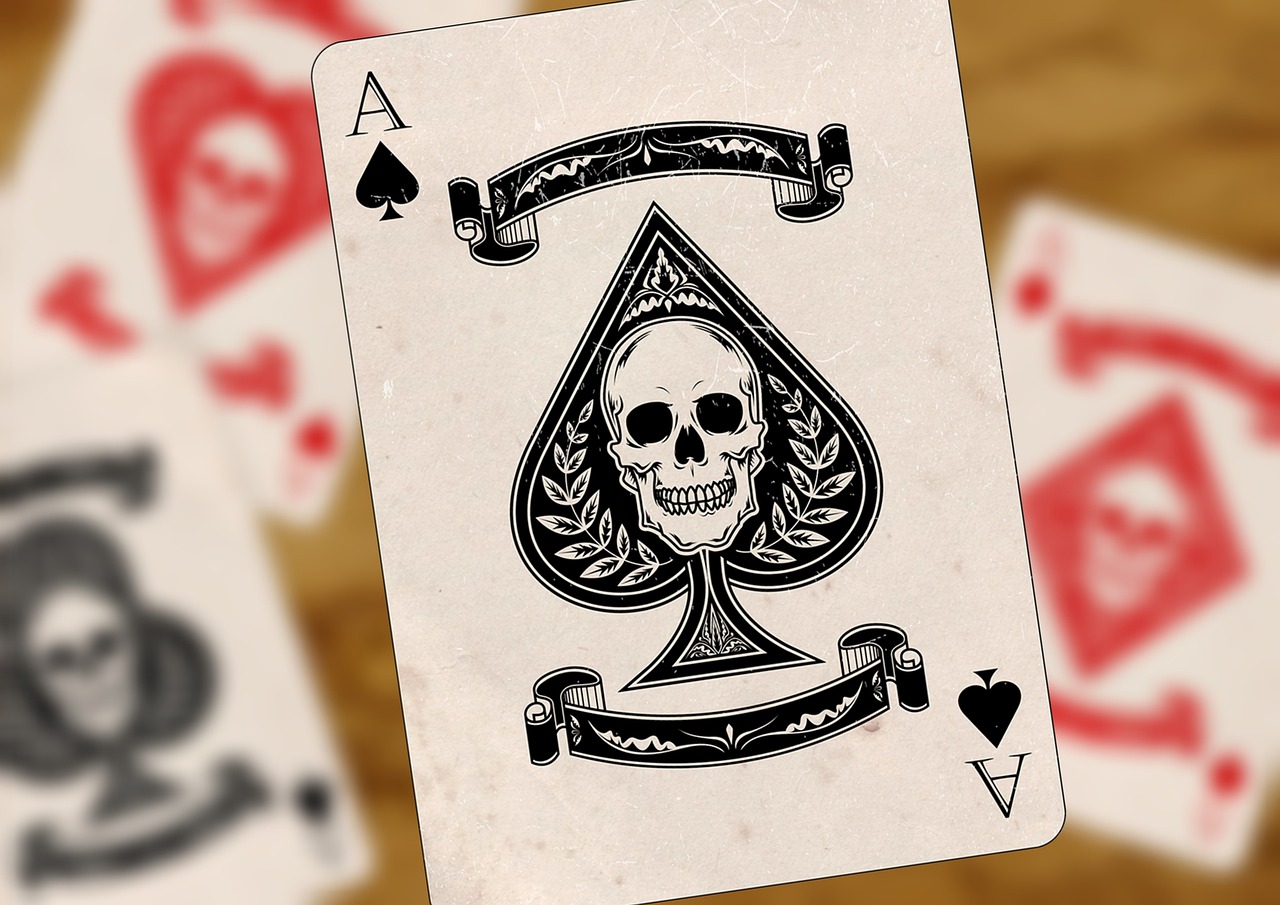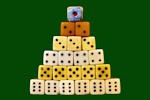How to Play Liar's Deck (From Liar's Bar) - Full Rules and Variants
- Video Games, Game Design
Latest revision:

The following are the rules of the Liar's Deck bluffing card game and its official variants, first introduced in the Liar's Bar video game. These rules are based on its in-game tutorials, observations I made from gameplay sessions, and comments from the game's developers. While there may be a few differences with the video game due to bugs, I believe these rules to be as accurate as intended.
Basic rules
Number of players: 2 to 4.
Goal of the game: Be the last player standing!
Material:
- 1 Liar card deck, containing 6 Kings, 6 Queens, 6 Aces and 2 Jokers.
- 1 Table card deck, containing 1 King, 1 Queen and 1 Ace.
- 1 Revolver card deck per player, each containing 1 Lethal and 5 Blanks.
Players should be sitting in a random order, with one of the players randomly designated as the first player of the first round.
Before the start of the game, each player should have a shuffled face down Revolver deck.
At the start of every round, shuffle the Table deck and reveal the top card. The revealed card type becomes the table type for the round. Until the end of the round, the cards matching the table type and the Jokers are considered Innocents, while all other cards are considered Liars. The Liar deck must then be shuffled with all of its cards, and 5 cards from it must be given to each player to form their hand. The first player for that round then starts their turn.
During their turn, a player has 30 seconds to either play 1 to 3 cards from their hand face down in a central pile, or call "LIAR" on the previous player if it's not the first turn of the round. If at least 1 card is played, the turn then goes to the next player, counterclockwise. When a player no longer has cards in their hand, their turns are skipped for the rest of the round. If only 1 player still have cards in hand, they must call "LIAR" on the previous player.
When "LIAR" is called, the cards played in the previous turn by the accused player are revealed. If at least one of the revealed cards is a Liar, the correctly-accused plays a round of Russian Roulette, otherwise the incorrect caller does.
To play a round of Russian Roulette, the player simply reveals the top card from their Revolver deck. If it is a Lethal, they are eliminated, otherwise the revealed Blank is discarded. Eliminated players skip their turns until the end of the game.
If all but 1 player have been eliminated, the game ends with the remaining player winning the game and all other players losing the game. Otherwise, a new round starts. The first player of that new round is assigned to the player that got caught playing a Liar last round, or the player that incorrectly called "LIAR" last round otherwise. If that player has just been eliminated, the next non-eliminated player in turn order must start the new round instead.
Devil variant
This variant allows a player to force all of its opponents to play Russian Roulette simultaneously over an additional type of bluff.
In the Devil variant, exactly 1 King, 1 Queen and 1 Ace must have a devil mark on them. (When using standard playing cards, the Spades suit may be used for this purpose.)
When a table type is selected, if there are 3 or more players remaining, the devil-marked card of that type is considered a Devil instead of an Innocent until the end of the round.
When playing cards face down, the Devil can only be played by itself.
If the Devil is releaved during a "LIAR" call, all other players that still have cards in their hand must also play Russian Roulette along with the caller except for the accused.
Chaos variant
This variant is designed for players to "shoot" at each other instead of just themselves.
Before the game starts, the following decks are modified with the following material:
- Liar deck: 5 Kings, 5 Queens, 1 Chaos and 1 Master.
- Table deck: 1 King and 1 Queen.
The Chaos and Master cards are never considered Liars after selecting a table type.
At the beginning of each round, 3 cards from the Liar deck are given to each player as their hand instead of the normal 5.
During their turn, a player may not play more than 1 card from their hand at a time.
If a player calls "LIAR", the normal consequence before ending the round is replaced by the following depending on the revealed card:
- An Innocent: The caller plays Russian Roulette as normal.
- A Liar: The caller plays Shoot Opponent instead.
- A Chaos: All non-eliminated players play Shoot Opponent simultaneously instead.
- A Master: The accused plays Shoot Opponent instead.
To play Shoot Opponent, a player has 9 seconds to point at a remaining opponent that is either the accused or one that still have a card in hand. Then, the pointer reveal the top of their Revolver deck. If it is a Lethal, the pointed opponent is eliminated if valid, otherwise the revealed Blank is discarded. If a player revealed a Lethal that way and is not eliminated before the end of the same round, their Revolver deck must be reset to their original state from the beginning of the game and shuffled.
If all players have been eliminated, the game ends in a draw.
Liar's Deck 2 variant
This variant allows for more long-term strategic plays over the original Liar's Deck.
Before the game starts, the following decks are modified with the following material:
- Liar deck: 8 Kings, 8 Queens, 8 Aces and 4 Jokers.
- Table deck: 1 King, 1 Queen, 1 Ace and 1 Joker.
At the beginning of each round, 7 cards from the Liar deck are given to each player as their hand instead of the normal 5.
During their turn, a player have the option of calling "DEVIL'S DEAL" in addition to its normal options if at least 4 cards were played this round. If "DEVIL'S DEAL" is called, the last 4 played cards are revealed. If all of them are Innocents, all other players that didn't have their played cards revealed this way or that still have cards in hand must play Russian Roulette, otherwise the caller does.
When a round ends, if at least 2 players still have cards in hand, the Liar deck is not re-shuffled, and players keep their current hands for the next round instead.
If the table type for a round is Joker, the Joker must be temporarily removed from the Table deck until the next time the Liar deck is shuffled.
After the first round, the first player of a new round is assigned to the player that called "DEVIL'S DEAL", or normal assignment occurs instead. If that player has just been eliminated, the next non-eliminated non-empty-handed player in turn order must start the new round instead.
Related content I wrote

The New Open Source Video Game Randomizer List Is Now Live
- Video Games, Programming
Time to update your bookmarks! After a few months of work behind the scenes, the new open source version of The BIG List of Video Game Randomizer is now live for your enjoyment, with dark mode support and a brand new UI for better readability! The new URL is: https://randomizers.debigare.com/ (The…

The Future of the Video Game Randomizer List
- Video Games, Programming, Anecdotes
It's hard to believe that it's been almost 8 years since I first posted on the ROMhacking.net forums a list of video game randomizers that I found online, and that it would evolve into the massive project it has become today, with almost 900 entries currently being listed. It's always a strange…

My Personal Video Game Completion List
- Anecdotes, Video Games
I thought it would be fun to track the long list of video game that I have beaten and/or completed for reference, so I've done just that! There may be a few mistakes here and there due to secret features unknown to me, or due to misremembering details of my past gaming experiences, but I believe the…

I Designed the Perfect Gambling Game, But...
- Mathematics, Business, Game Design
Back in 2006-07-08, during the 13th Canadian Undergraduate Mathematics Conference at McGill University, I presented a gambling game I designed with the novel property of being both advantageous to players and the house, and that despite this proprety, that pretty much nobody in their right mind…

After 8 Years, Double Fine's Hack 'n' Slash Secret Room Has Finally Been Cracked
- Video Games, Security
In the history of obscure video game secrets, not many has been quite infamous as the SecretRoom.lua puzzle in 2014's computer hacking game Hack 'n' Slash by Double Fine. Since the game's release, a mysterious encrypted file was found in the game files, yet despite the very nature of the game being…